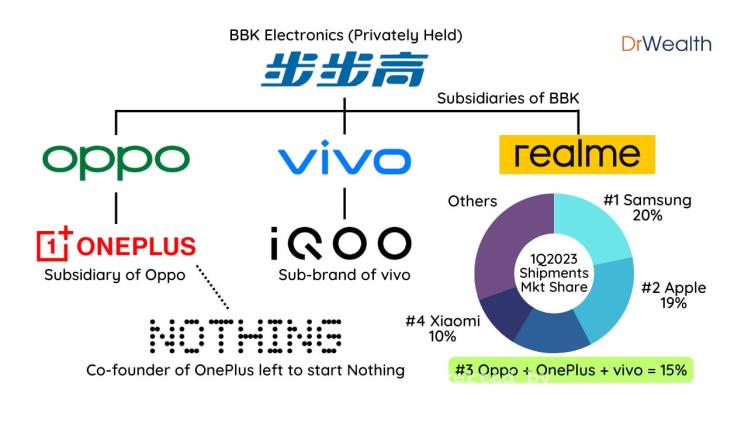Contents
Introduction
BBK Electronics is a name that might not resonate with every consumer, yet it is one of the most influential companies in the global consumer electronics industry. Founded in 1995 by Duan Yongping, this Chinese multinational conglomerate has made a significant mark on the world through its subsidiaries and brand portfolio, which includes some of the most popular smartphone brands such as Oppo, Vivo, Realme, and OnePlus. BBK Electronics operates across various segments, including smartphones, consumer electronics, and smart devices. This article delves into the history, business strategy, product portfolio, and global impact of BBK Electronics, highlighting why it is a force to be reckoned with in the technology industry.
History and Background
BBK Electronics was founded in 1995 in Dongguan, Guangdong Province, China. Initially, the company focused on producing a variety of consumer electronics, including CD players, MP3 players, and other small electronics. Under the leadership of its founder, Duan Yongping, BBK quickly expanded its business. However, the company’s real breakthrough came when it shifted its focus to the burgeoning mobile phone industry.
BBK Electronics made its first major entry into the mobile phone market through the launch of Oppo in 2004. Oppo initially focused on MP3 players and DVD players but later transitioned into the mobile phone market. The success of Oppo led BBK to diversify further, and in 2009, Vivo was launched as another subsidiary, focusing on the mid-range and premium smartphone segments.
In 2013, BBK’s expansion strategy took another leap forward with the launch of OnePlus, a brand that targeted tech enthusiasts and offered flagship-level smartphones at competitive prices. The success of OnePlus was followed by the introduction of Realme in 2018, a brand focused on the budget-conscious segment, particularly in emerging markets like India.
Business Strategy and Structure
BBK Electronics operates as a parent company, overseeing its various subsidiaries and brands. Each brand under the BBK umbrella operates independently, with its own research and development (R&D), marketing, and sales strategies. This decentralized approach has allowed BBK to cater to a wide range of consumers, from budget-conscious buyers to those seeking premium devices.
The company’s strategy revolves around creating a diverse portfolio of brands, each targeting different market segments. Oppo and Vivo primarily focus on the Chinese market and Southeast Asia, offering a wide range of smartphones across different price points. OnePlus, on the other hand, has gained a strong foothold in North America, Europe, and India, with its emphasis on high-performance devices and a community-driven approach. Realme, being the youngest brand, has rapidly grown in emerging markets by offering feature-packed smartphones at aggressive prices.
This multi-brand strategy allows BBK to dominate different segments of the smartphone market while minimizing internal competition. By creating distinct identities for each brand, BBK can tailor its marketing efforts and product offerings to specific demographics, ensuring a strong presence in various regions.

Product Portfolio
BBK Electronics has an extensive product portfolio that spans across multiple categories. While the company is best known for its smartphones, its subsidiaries also produce a wide range of consumer electronics, including smart TVs, audio products, and accessories.
- Oppo: Oppo is known for its innovation in smartphone design and camera technology. The brand has introduced several industry-firsts, such as the rotating camera and ultra-fast charging technology. Oppo’s product lineup includes the flagship Find series, the Reno series, and the A series, catering to different market segments.
- Vivo: Vivo has positioned itself as a brand that emphasizes innovation and cutting-edge technology. The company was among the first to introduce in-display fingerprint sensors and pop-up selfie cameras. Vivo’s product range includes the premium X series, the camera-focused V series, and the budget-friendly Y series.
- OnePlus: OnePlus started as a flagship killer, offering high-end specifications at mid-range prices. Over time, the brand has expanded its portfolio to include the premium OnePlus 9 and 10 series, the mid-range Nord series, and various accessories like earbuds and smartwatches.
- Realme: Realme is known for its aggressive pricing and strong value proposition. The brand has quickly gained popularity in markets like India and Southeast Asia. Realme’s product lineup includes the number series, which targets the budget segment, and the GT series, which offers flagship features at competitive prices.
- iQOO: iQOO, a sub-brand of Vivo, focuses on high-performance smartphones targeted at gamers and power users. The brand offers devices with top-tier processors, advanced cooling systems, and high refresh rate displays.
Beyond smartphones, BBK’s subsidiaries also produce other consumer electronics. For instance, Oppo and OnePlus have ventured into the smart TV market, while Realme has introduced a range of AIoT (Artificial Intelligence of Things) products, including smartwatches, fitness bands, and wireless earbuds.
Global Impact and Market Presence
BBK Electronics has made a significant impact on the global smartphone market. As of recent years, the company, through its various brands, consistently ranks among the top smartphone manufacturers in the world. In markets like China and India, BBK’s brands dominate, holding substantial market shares. For instance, Oppo and Vivo have been leading players in China, while Realme has disrupted the Indian market with its affordable offerings.
In addition to its success in Asia, BBK Electronics has made inroads into Europe and North America, particularly through OnePlus. The brand’s emphasis on community engagement, software updates, and premium design has resonated well with tech-savvy consumers in these regions.
The company’s success can also be attributed to its focus on R&D. BBK invests heavily in research and development, with multiple R&D centers across China and other countries. This investment has led to innovations in camera technology, battery performance, and smartphone design, keeping BBK’s brands competitive in a rapidly evolving market.
Challenges and Future Outlook
Despite its success, BBK Electronics faces several challenges. The global smartphone market is highly competitive, with other Chinese giants like Xiaomi, Huawei, and Transsion Holdings vying for market share. Additionally, geopolitical tensions, particularly between the United States and China, pose potential risks for BBK’s global operations, especially for brands like OnePlus that rely on the North American market.
However, BBK Electronics has demonstrated a strong ability to adapt and innovate. The company’s focus on diversification, both in terms of product offerings and geographic presence, positions it well to navigate these challenges. Furthermore, with the increasing convergence of smartphones, AI, and IoT, BBK is likely to expand its product ecosystem, leveraging its technological expertise to enter new markets and categories.
Conclusion
BBK Electronics is a powerful yet often under-recognized force in the global electronics industry. With its unique multi-brand strategy, extensive product portfolio, and commitment to innovation, the company has secured a dominant position in the smartphone market. As BBK continues to grow and evolve, it is poised to shape the future of consumer electronics, not just in China but across the world. Whether through the latest flagship smartphone, a smart TV, or an IoT device, BBK Electronics’ influence is felt in the hands and homes of millions of consumers globally.
